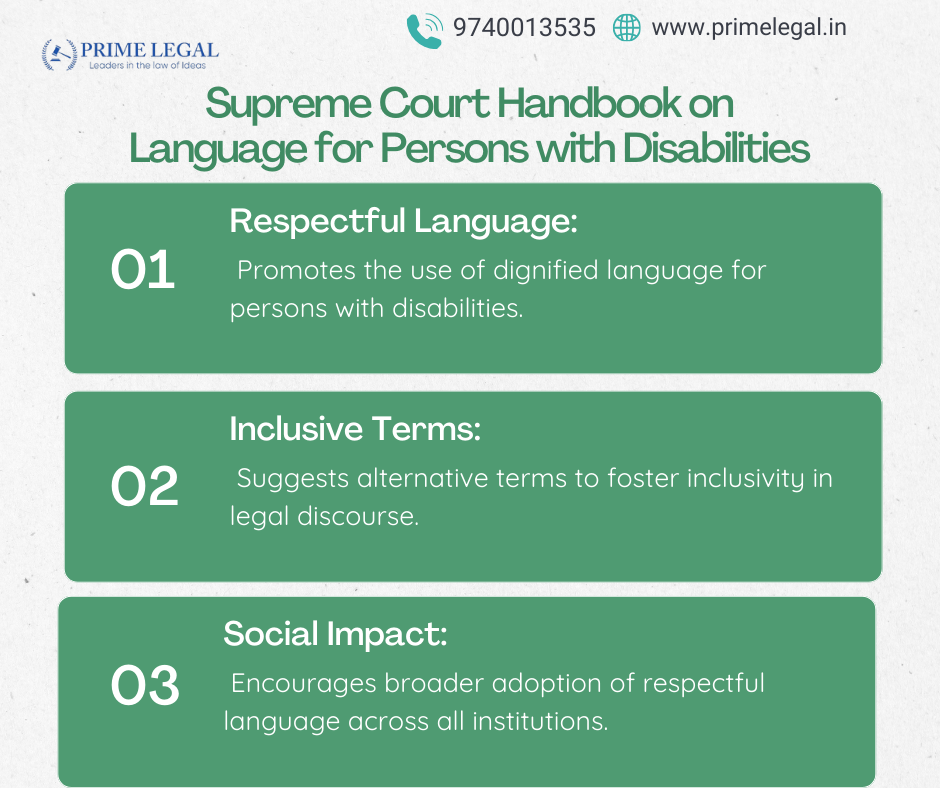BACKGROUND-
The Chief Justice of India Dr. D.Y. Chandrachud on Saturday launched the ‘Handbook Concerning Persons with Disabilities’ of the Supreme Court of India at the 9th Annual National Consultation Stakeholders Consultation on ‘Protecting the Rights of Children Living with Disability and Intersectionality of Disabilities’ organised by the Juvenile Justice Committee, Supreme Court of India and in association with UNICEF India.
Justice B.V. Nagarathna, Chairman of the Juvenile Justice Committee, who spoke at the event, referred to the judgment of the Supreme Court on disability rights which states: “Language that individualizes the impairment and overlooks the disabling social barriers (e.g. terms such as “afflicted”, “suffering”, and “victim”) should be avoided or adequately flagged as contrary to the social model.’
The handbook prepared under the guise of Justice Nagarathna under Part II has dedicated an entire chapter titled ‘Language and Disabilities’.
INTRODUCTION-
The handbook states: “The language used by judges in their judgments carries immense weight and has the power to shape societal perceptions and attitudes. When it comes to addressing matters involving persons with disabilities, the use of sensitive language is of paramount importance. Judges must be mindful of avoiding de-humanising or demeaning terminology that perpetuates stigma and reinforces negative stereotypes.”
This is in line with what Justice Nagarathna stated in her opening address. She said: “Children with disability can face stigma along with negative attitudes that place them at increased risk of violence, neglect abuse and exploitation. Violent forms of discipline can also be given by prevailing attitude towards disability.”
It states that some term terms that must be avoided while referring to persons with disabilities are: Infirm; Stunted; Unfit; Helpless; Crippled; Defected; Deformed; Invalid; Lame; Maimed; Mutilated; or Subnormal.
Some key terms to avoid when referring to persons with intellectual or learning disabilities or mental health conditions are: Crazy; Freak; Idiot; Insane; Loony; Mad; Maniac; Nut Case; Nuts; Nutter; Psycho; Simpleton; Stupid; or Unhinged.
“When it comes to addressing matters involving persons with disabilities, the use of sensitive language is of paramount importance. Judges must be mindful of avoiding dehumanising or demeaning terminology that perpetuates stigma and reinforces negative stereotypes,” the Handbook stated.
KEY ASPECTS-
The handbook has suggested that no offensive terms such as “crippled,” “idiot,” “loony,” “mad,” “junkie,” and “retard” should not be used in any derogatory contexts. Some terms such as “people of determination,” “special,” and “differently-abled” are also considered condescending and offensive because they stigmatise the language around disability by substituting it.
The handbook states that ‘people-first approach’ rather than ‘identity-first approach’ should be employed for persons with disabilities. For instance, ‘persons with a disability’ is a people-first approach where the individual is recognised and prioritised before the disability.
Examples- ‘Persons with a hearing disability’ as opposed to ‘hearing disabled person’.
This is in line with the Rights of Persons with Disabilities Act, 2016 in consonance with United Nations Convention on Rights of Persons with Disabilities, 2006.
Alternatively, the handbook suggests that some individuals may prefer or find acceptable an identify-first approach that puts disability first in the description. For instance, ‘blind person’ instead of ‘person with blindness’.
If that is the case, the handbook suggests that when in doubt, best to ask individuals how they wish to identify.
CONCLUSION-
Last year, the Supreme Court released “Handbook on Combating Gender Stereotypes”, in order to identify and remove the use of words and phrases, which are loaded with gender stereotypes, in judgments and court language.
This year, the Supreme Court in a significant judgment debunked the use of terms like ‘child pornography’ and instead suggested that the Court and judgments shall use ‘Child Sexual Exploitative & Abuse Material’.
“PRIME LEGAL is a full-service law firm that has won a National Award and has more than 20 years of experience in an array of sectors and practice areas. Prime legal fall into a category of best law firm, best lawyer, best family lawyer, best divorce lawyer, best divorce law firm, best criminal lawyer, best criminal law firm, best consumer lawyer, best civil lawyer.”
Written by- ALOK G. CHHAPARWAL


